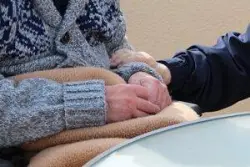
The decision to place a loved one in a nursing home is often difficult, but it’s also accompanied by certain expectations of care. When people choose to entrust the care of their loved one to another, they place their trust in that caregiver. Unfortunately, that trust is often broken.
Elder abuse in nursing homes is not extremely common, but it does happen. Recent statistics provided by the National Center on Elder Abuse show that millions of elderly Americans are subjected to abuse or neglect in nursing homes each year. As many as one in 10 adults aged 60+ have experienced some form of elder abuse, and understanding the signs of abuse and neglect is crucial for safeguarding your loved one. How can you recognize these signs, and what should you do if you suspect elder abuse or neglect is taking place? Thankfully, you do have recourse.
What are the Most Common Types of Nursing Home Abuse?
Nursing home abuse and neglect can range from physical harm to mental/emotional and even sexual abuse. The most common types of elder abuse and neglect in nursing homes are:
- Physical Abuse: This can involve many types of injuries or general pain.
- Emotional or Psychological Abuse: This can include verbal assaults, threats, or other behavior or language that inflicts emotional harm.
- Sexual Abuse: Any sexual contact between employees and residents of nursing homes, of any kind, is not allowed, even if the sexual acts are consensual.
- Neglect: Abuse goes beyond intentional harm and can include the failure to provide basic needs. This can include food, water, shelter, and medical care.
- Financial Exploitation: Not all abuse creates personal harm. The harm done can be financial. This can include unauthorized use of an elderly resident’s financial resources.
Have You Been Injured In An Accident? Contact Morelli Law
877-751-9800The Signs of Nursing Home Neglect and Abuse
In order to protect your loved ones, you’ll need to be able to recognize the common signs of neglect and abuse in a nursing home. These signs can include:
- Physical injuries like unexplained bruises or cuts
- Frequent infections
- Signs of poor hygiene
- Sudden weight loss or dehydration
- Emotional changes
- Withdrawal from social activities
- Sudden changes in behavior or mood
- Signs of fear or anxiety around certain staff members
You can also keep an eye out for environmental red flags that include:
- Unsafe living conditions
- Lack of cleanliness in the resident’s room or the common areas
- The lack of basic supplies or amenities
- Inadequate staffing at the facility
Why it Matters: The Negative Impacts of Neglect and Abuse
Victims of nursing home neglect and abuse will often suffer from long-term physical and psychological effects. It’s not a mere moment of pain; consistent abuse results in trauma that severely impacts a person for the rest of their life.
The long-term impacts of nursing home include:
- Depression
- Anxiety
- Fear
- Lack of trust
- Worsening health conditions
- Lower quality of life
- Permanent disabilities
- Erosion of relationships
- Isolation
- Confusion and disorientation
- Death or decreased lifespan
Do not wait to act if you notice any signs of nursing home abuse with your loved ones.
Contact our personal injury lawyers today
877-751-9800How to Report Nursing Home Abuse and What to Do After
If you suspect that a loved one is a victim of nursing home abuse or neglect, taking immediate action is crucial:
- Document the Evidence: Keep detailed notes of any signs or incidents of abuse, including dates, times, names, and descriptions of what you observed or reported. Documentation provides crucial evidence that can be used in investigations and legal actions. It helps establish a pattern of abuse and can corroborate the victim’s claims.
- Speak with Your Loved One: If possible, privately and gently talk to your loved one about your concerns. Ask open-ended questions to encourage them to share their experiences. This gives the resident a chance to express their concerns or disclose abuse. It’s important to approach the conversation with sensitivity and without making them feel like they are at fault.
- Report the Incident: Report your concerns to the nursing home’s management or the resident’s primary care providers. Request an immediate investigation into your concerns. Facilities are legally required to investigate abuse reports and protect their residents. Reporting also formally puts the facility on notice, which can be important for any later legal action.
- Contact Adult Protective Services (APS): Report your suspicions to your local Adult Protective Services agency, which can investigate allegations of abuse, neglect, or exploitation in care facilities. APS has the authority to conduct investigations and work with law enforcement to ensure the safety of vulnerable adults. They can also connect victims with resources for support and recovery.
- Seek Legal Advice: Consulting with a nursing home abuse law firm. An experienced attorney can advise you on the legal options available, help you navigate the complex legal system, and work to hold the abusers accountable. Legal action can also result in compensation for the victim and help prevent future abuse.
Work with Our Nursing Home Neglect Lawyers at Morelli Law
If you or someone you know is facing this situation, our firm is here to help. With expertise in elder law and a commitment to justice, we stand ready to support families and advocate for the rights and dignity of nursing home residents. All our attorneys work for a contingency fee. That means they’ll litigate your case for a portion of your total compensation. Nursing home abuse is a serious issue, and we are serious about getting you and your loved ones the justice you deserve. Call us for a free case evaluation today.
Call or text 877-751-9800 or complete a Free Case Evaluation form







